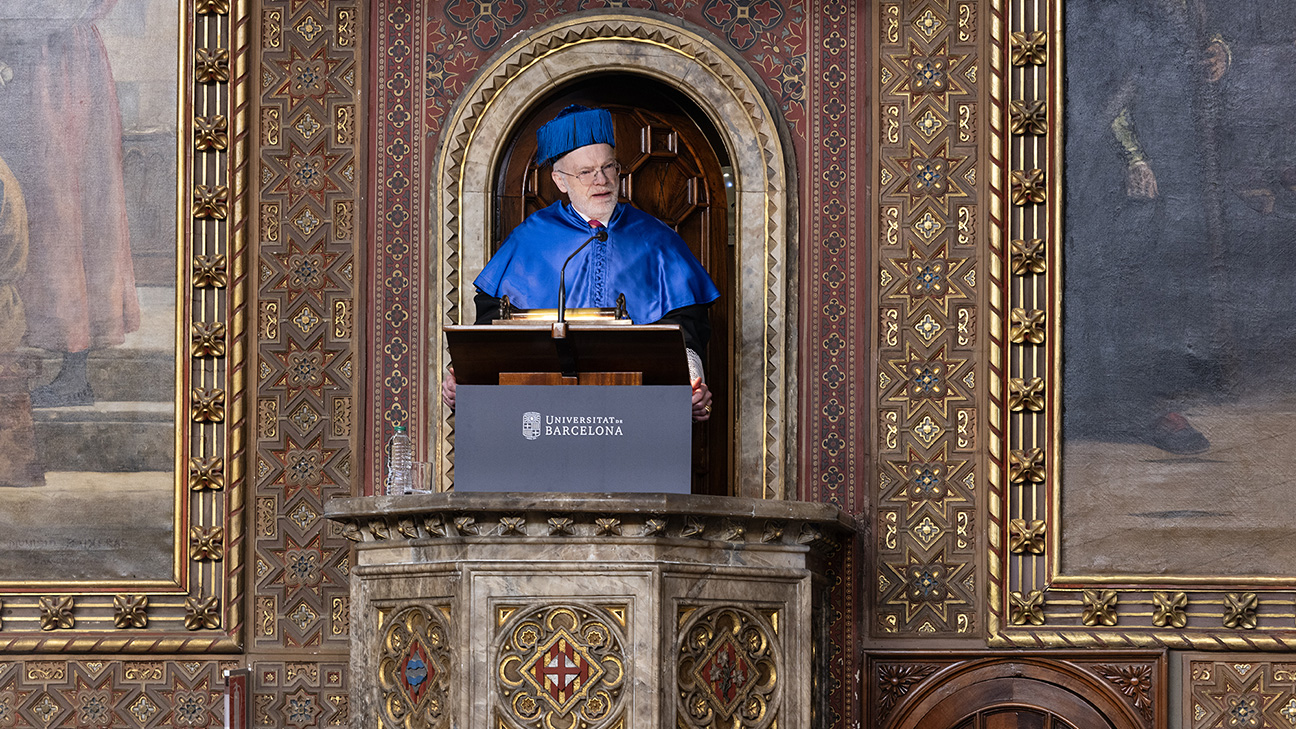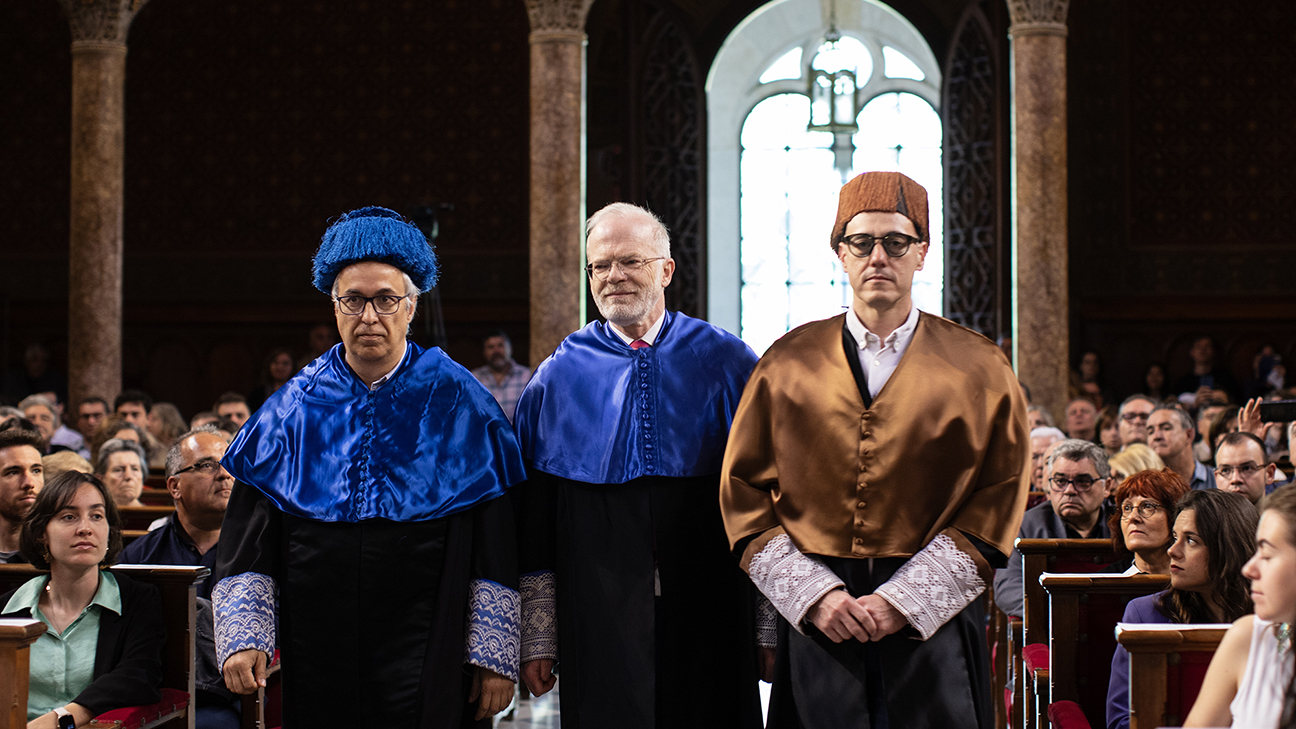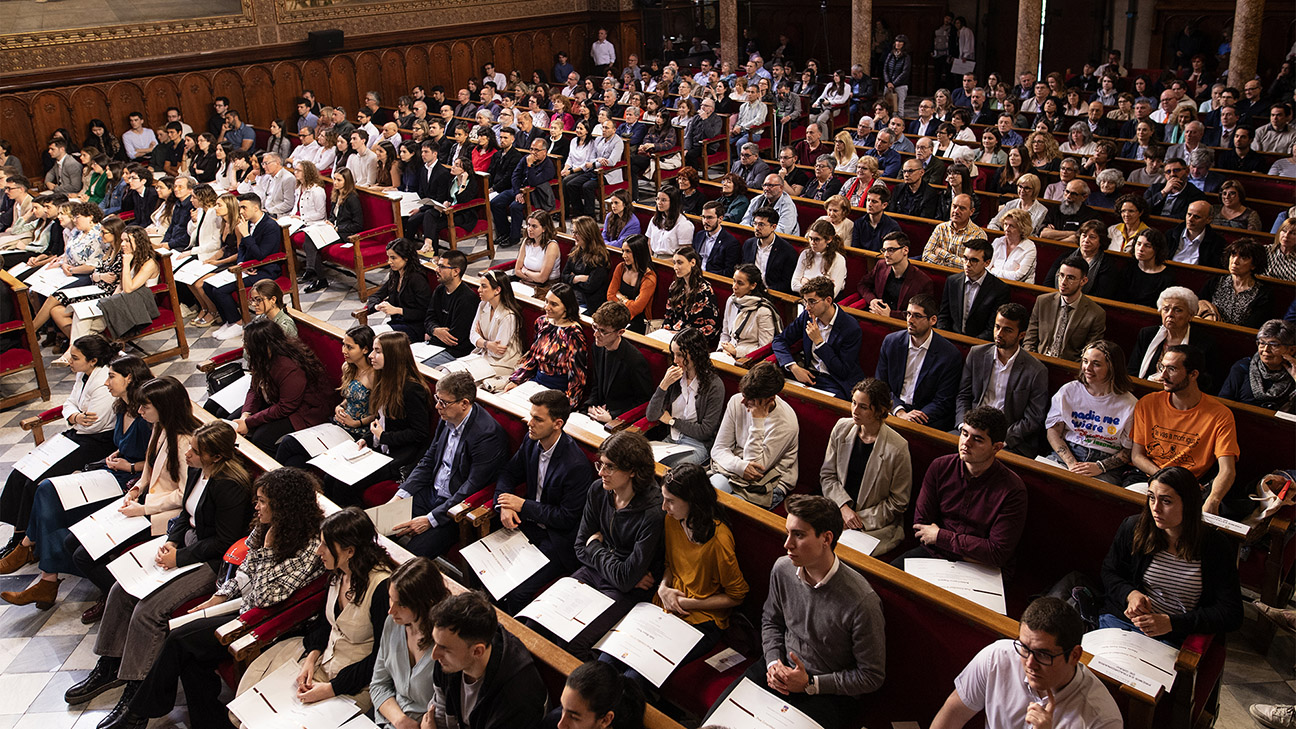Honoris causa Kristian Seip stresses that mathematics is essential for cryptography and online security

Kristian Seip, professor at the Norwegian University of Science and Technology in Trondheim
News
|
Institutional
|
Academic
(19/04/2024)
Today, the University of Barcelona gave an honorary doctorate to Kristian Seip, professor at the Norwegian University of Science and Technology (NTNU) in Trondheim, in a ceremony presided over by the Rector, Joan Guàrdia. The sponsor was Professor Joaquim Ortega-Cerdà, from the UB’s Faculty of Mathematics and Computer Science and a member of the UB Institute of Mathematics (IMUB).

Kristian Seip, professor at the Norwegian University of Science and Technology in Trondheim
News
|
Institutional
|
Academic
19/04/2024
Today, the University of Barcelona gave an honorary doctorate to Kristian Seip, professor at the Norwegian University of Science and Technology (NTNU) in Trondheim, in a ceremony presided over by the Rector, Joan Guàrdia. The sponsor was Professor Joaquim Ortega-Cerdà, from the UB’s Faculty of Mathematics and Computer Science and a member of the UB Institute of Mathematics (IMUB).
A thirty-year relationship with Barcelona
The professor began his speech by highlighting his personal and scientific relationship with Barcelona and its mathematical community: “It holds a special place in my heart”. He also stressed “the inspiration, the privilege and the great pleasure” that it has meant for him to participate so actively in the “vivid and prosperous mathematical life” of the city over the last thirty years.
The NTNU professor then reflected on mathematics, which he described as “the most intellectually gratifying of human activities”, and stressed that he is “fortunate to be engaged” in a world that “is profoundly influenced by the needs for ever more sophisticated mathematics for science and technology”.
Professor Seip gave a brief description of his scientific profile, using the words of physicist and mathematician Freeman Dyson at the AMS Einstein conference in 2008, where he poetically differentiated between two types of mathematicians: those who focused on details — frogs — and those who had a broader view — birds. “I would class myself as a frog, but I may also take delight in the bird’s perspective”, he said.
During the speech, he also highlighted two 19th-century publications “of fundamental importance” in most of his research. One is Jean-Baptiste Joseph Fourier’s 1822 treatise on the analytical theory of heat, which he defined as a key work for the “development of mathematics and, in turn, for physics and modern information and communication technologies”. The second publication he mentioned was Bernhard Riemann's 1859 memoirs on number theory, with which Riemann introduced "radically new ideas" in the study of prime numbers. “Prime numbers are now vital to cryptography and therefore to online commerce and security. In other words, we rely crucially on the properties of prime numbers in our everyday life”," he added.
Uncertainty principle projects
Regarding the contemporary developments that have inspired and influenced his research, Seip emphasised that much of the work he has been involved in is related to the uncertainty principle. He mentioned the “wavelet revolution”, which gave impetus to explorations of “new incarnations” of the uncertainty principle. “I got involved in such work in the early 1990s, and so did the group of analysts in Barcelona led by Joaquim Bruna. This common scientific interest prompted my enduring interaction with its members and with Joaquim Ortega-Cerdà”, he recalled.
Sharing and learning from others
In his speech, he also reflected on the importance for mathematics of “learning from others and sharing”. He talked about the hard problems, for which one has to “be tenacious and willing to think about the same thing for a long time”. However, he explained that there are hard problems that require “more than ingenuity and stubbornness”, which call for “a new revolutionary new insight, a detour into a mathematical landscape still unexplored to have the power to unlock their mystery”.
The professor began his speech by highlighting his personal and scientific relationship with Barcelona and its mathematical community: “It holds a special place in my heart”. He also stressed “the inspiration, the privilege and the great pleasure” that it has meant for him to participate so actively in the “vivid and prosperous mathematical life” of the city over the last thirty years.
The NTNU professor then reflected on mathematics, which he described as “the most intellectually gratifying of human activities”, and stressed that he is “fortunate to be engaged” in a world that “is profoundly influenced by the needs for ever more sophisticated mathematics for science and technology”.
Professor Seip gave a brief description of his scientific profile, using the words of physicist and mathematician Freeman Dyson at the AMS Einstein conference in 2008, where he poetically differentiated between two types of mathematicians: those who focused on details — frogs — and those who had a broader view — birds. “I would class myself as a frog, but I may also take delight in the bird’s perspective”, he said.
During the speech, he also highlighted two 19th-century publications “of fundamental importance” in most of his research. One is Jean-Baptiste Joseph Fourier’s 1822 treatise on the analytical theory of heat, which he defined as a key work for the “development of mathematics and, in turn, for physics and modern information and communication technologies”. The second publication he mentioned was Bernhard Riemann's 1859 memoirs on number theory, with which Riemann introduced "radically new ideas" in the study of prime numbers. “Prime numbers are now vital to cryptography and therefore to online commerce and security. In other words, we rely crucially on the properties of prime numbers in our everyday life”," he added.
Uncertainty principle projects
Regarding the contemporary developments that have inspired and influenced his research, Seip emphasised that much of the work he has been involved in is related to the uncertainty principle. He mentioned the “wavelet revolution”, which gave impetus to explorations of “new incarnations” of the uncertainty principle. “I got involved in such work in the early 1990s, and so did the group of analysts in Barcelona led by Joaquim Bruna. This common scientific interest prompted my enduring interaction with its members and with Joaquim Ortega-Cerdà”, he recalled.
Sharing and learning from others
In his speech, he also reflected on the importance for mathematics of “learning from others and sharing”. He talked about the hard problems, for which one has to “be tenacious and willing to think about the same thing for a long time”. However, he explained that there are hard problems that require “more than ingenuity and stubbornness”, which call for “a new revolutionary new insight, a detour into a mathematical landscape still unexplored to have the power to unlock their mystery”.
Kristian Seip, one of the fundamental figures in mathematical analysis, has made very influential contributions to the world of mathematics, both from a theoretical point of view — with operator theory and number theory — and in more applied areas, among which signal theory stands out.
Regarding the challenge of discovering what “this new unknown vision” should be, the mathematician stressed that “all kinds of collaboration, be it between close associates or across subfields, are invaluable for the progress of our science: we know different things, our perspectives vary and, therefore, working together is almost always productive and rewarding”. In this sense, he emphasized that "it is a wonderful thing, when you realize that the key to unlocking the mystery comes from a part of the mathematical landscape that you are not used to moving through”.
These collaborations, also “across borders and continents” are a hallmark of mathematics and “a wonderful gift”, which has benefited from modern digital communications, although these “can never replace face-to-face meetings”, he concluded.
World leader in mathematical analysis
For his part, the sponsor of the ceremony, Joaquim Ortega-Cerdà, from the UB’s Department of Mathematics and Computer Science, praised Professor Kristian Seip, whom he described as “one of the world’s leading researchers in mathematical analysis”, with research that “combines extremely original new perspectives, profound ideas and impressive technical skills”.
Joaquim Ortega-Cerdà explained how Professor Seip’s “fundamental contributions” in recent decades have been “extremely influential and have become classic results in research”, highlighting some of his early work that constituted major breakthroughs.
Significant research in the field of signal theory
In this sense, the UB professor recalled how Seip transported techniques that originated in the results of the mathematician Beurling in the 1960s to current problems of function theory and that had become relevant again in the technological world with the development of wavelets. “In this way he solved a problem of digitization of analogue signals, a problem that originated in engineering with powerful tools of complex analysis”, he stressed.
The UB professor explained how this “scientific leadership” has been recognized, as Professor Seip was president of the Abel Prize Committee — the most prestigious prize in Mathematics, “equivalent to the Nobel Prize in other disciplines"— from 2006 to 2010 and also “is, or has been, editor of some of the most prestigious mathematical journals, such as Acta Mathematica or the Journal of Functional Analysis”.
Finally, the sponsor highlighted his special relationship with Barcelona and the Catalan mathematical community, recalling that he is the editor of Collectanea Mathematica — the UB’s mathematics journal —, is also a member of the Scientific Committee of the Ferran Sunyer i Balaguer Prize, awarded by the foundation of the same name, and has been a member of the Scientific Advisory Board of the Mathematical Research Centre. “His involvement and commitment has helped to strengthen the scientific structures in mathematics in Catalonia”, he stressed.
The extraordinary bachelor’s degree awards for the 2021-2022 academic year were then presented.
The president of the Board of Trustees, Joan Corominas, highlighted the great importance of the event, which “brings together the consolidated wisdom of Kristian Seip with the emerging talent of the award winners”. He also emphasized the “effort and motivation as the basic ingredients of academic excellence and knowledge, but always from the perspective of generosity and shared knowledge”.
Finally, the Rector, Joan Guàrdia, who closed the ceremony, recognised “the great scientific relevance of Dr Seip’s work”, making special mention of his “generosity as an essential element of progress”. Thus, he wanted to show the award winners that “despite success, commitment to generosity, which is not always easy to achieve, is the only way for those who come after us to go further than us”. “Contributing is what makes us truly great,” he concluded.
These collaborations, also “across borders and continents” are a hallmark of mathematics and “a wonderful gift”, which has benefited from modern digital communications, although these “can never replace face-to-face meetings”, he concluded.
World leader in mathematical analysis
For his part, the sponsor of the ceremony, Joaquim Ortega-Cerdà, from the UB’s Department of Mathematics and Computer Science, praised Professor Kristian Seip, whom he described as “one of the world’s leading researchers in mathematical analysis”, with research that “combines extremely original new perspectives, profound ideas and impressive technical skills”.
Joaquim Ortega-Cerdà explained how Professor Seip’s “fundamental contributions” in recent decades have been “extremely influential and have become classic results in research”, highlighting some of his early work that constituted major breakthroughs.
Significant research in the field of signal theory
In this sense, the UB professor recalled how Seip transported techniques that originated in the results of the mathematician Beurling in the 1960s to current problems of function theory and that had become relevant again in the technological world with the development of wavelets. “In this way he solved a problem of digitization of analogue signals, a problem that originated in engineering with powerful tools of complex analysis”, he stressed.
The UB professor explained how this “scientific leadership” has been recognized, as Professor Seip was president of the Abel Prize Committee — the most prestigious prize in Mathematics, “equivalent to the Nobel Prize in other disciplines"— from 2006 to 2010 and also “is, or has been, editor of some of the most prestigious mathematical journals, such as Acta Mathematica or the Journal of Functional Analysis”.
Finally, the sponsor highlighted his special relationship with Barcelona and the Catalan mathematical community, recalling that he is the editor of Collectanea Mathematica — the UB’s mathematics journal —, is also a member of the Scientific Committee of the Ferran Sunyer i Balaguer Prize, awarded by the foundation of the same name, and has been a member of the Scientific Advisory Board of the Mathematical Research Centre. “His involvement and commitment has helped to strengthen the scientific structures in mathematics in Catalonia”, he stressed.
The extraordinary bachelor’s degree awards for the 2021-2022 academic year were then presented.
The president of the Board of Trustees, Joan Corominas, highlighted the great importance of the event, which “brings together the consolidated wisdom of Kristian Seip with the emerging talent of the award winners”. He also emphasized the “effort and motivation as the basic ingredients of academic excellence and knowledge, but always from the perspective of generosity and shared knowledge”.
Finally, the Rector, Joan Guàrdia, who closed the ceremony, recognised “the great scientific relevance of Dr Seip’s work”, making special mention of his “generosity as an essential element of progress”. Thus, he wanted to show the award winners that “despite success, commitment to generosity, which is not always easy to achieve, is the only way for those who come after us to go further than us”. “Contributing is what makes us truly great,” he concluded.
Multimedia gallery




